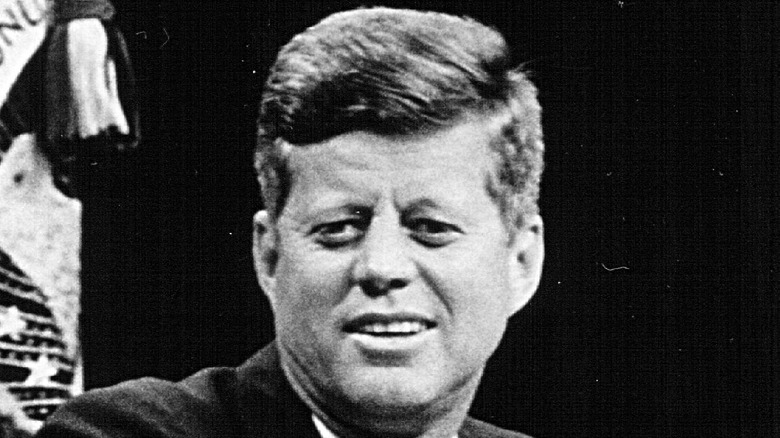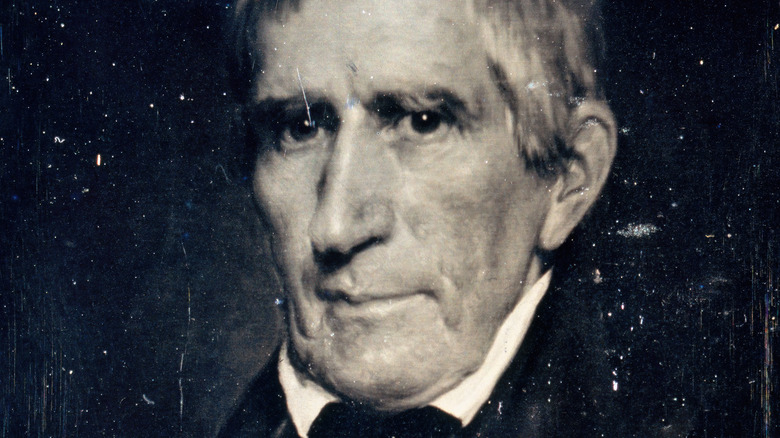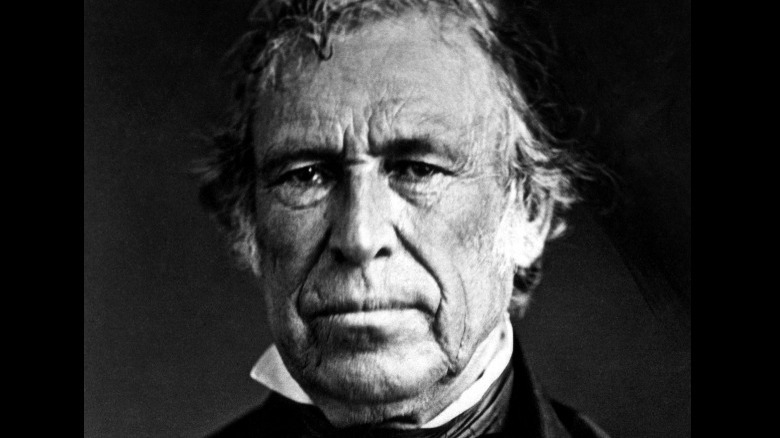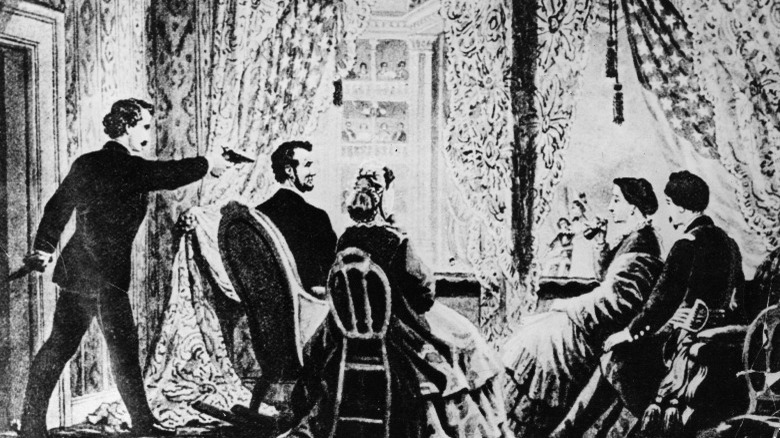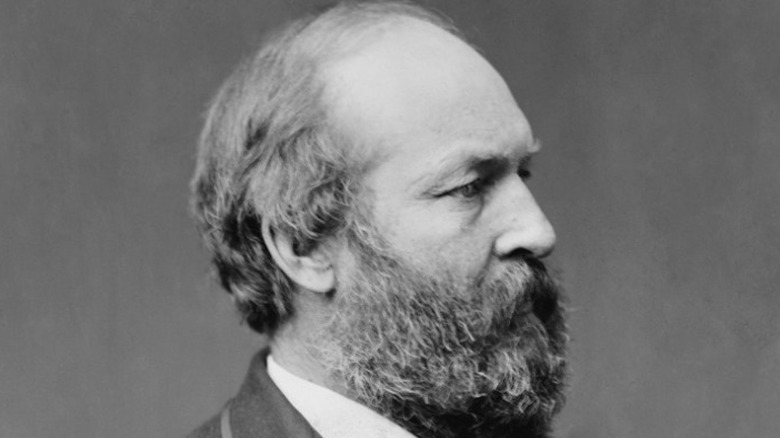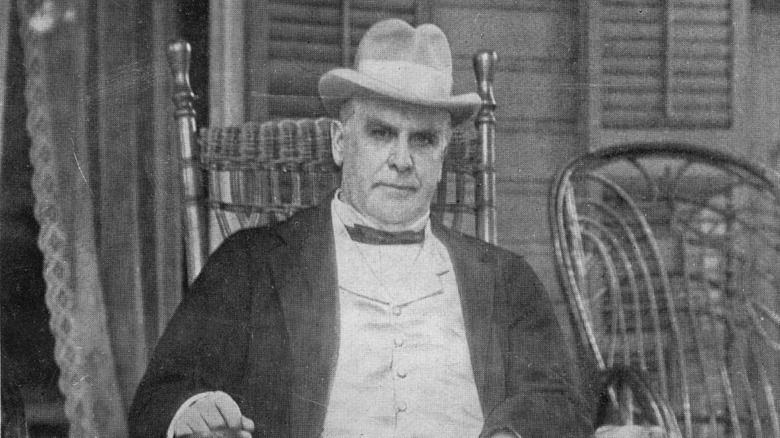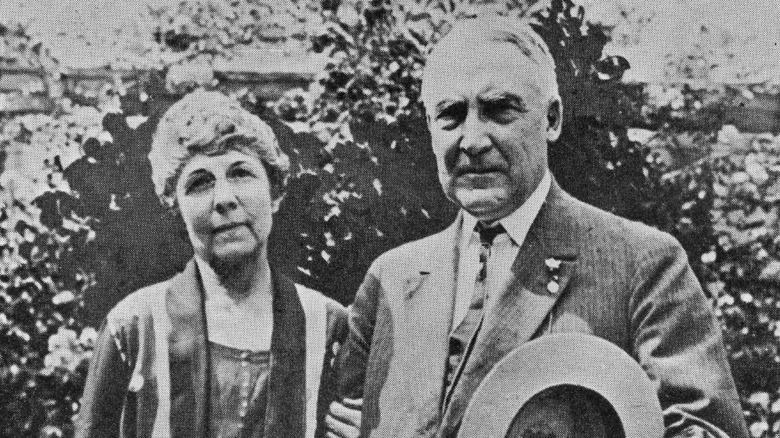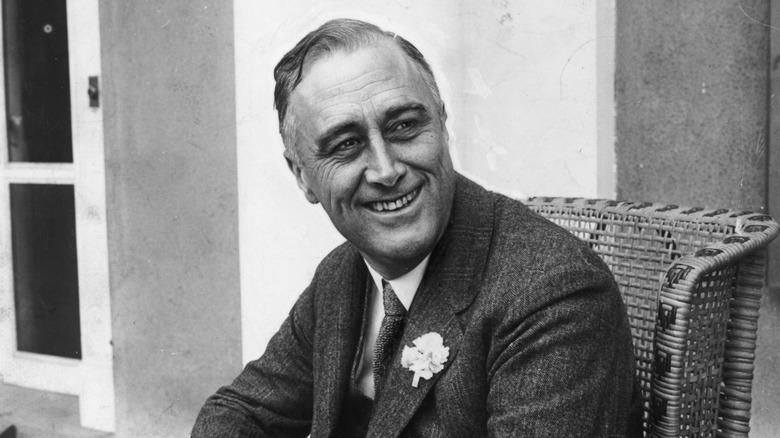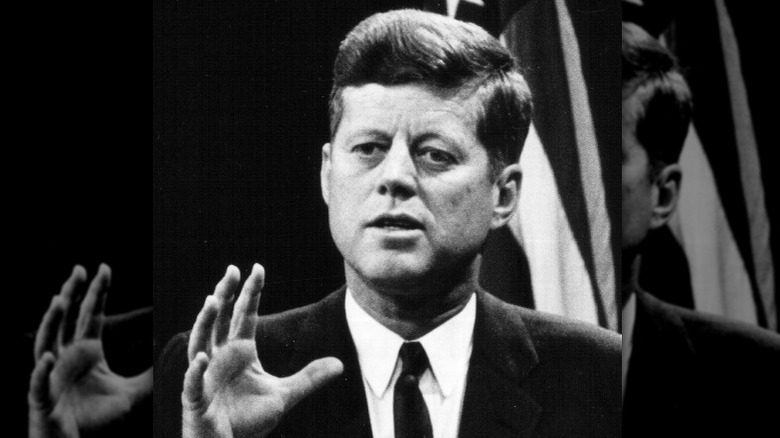The Only US Presidents To Die In Office So Far
Since 1789, 45 different men have served as president of the United States. Only eight of them have died while holding office as president.
While the labors of the job have some speculating that those with the title age faster (via CNN), a study in the Journal of the American Medical Association concluded that being president didn't kill you faster. In fact, it actually showed longevity in those who held the office.
Of those who died, four were assassinated, but even among the four who died of seemingly natural causes, mystery, and suspicion surround their deaths.
William Henry Harrison
A letter included in the 1840 book "The Life and Times of William Henry Harrison" laid out the titular man's thoughts on what the most important aspects of a president and his administration were. The first item on the list: "To confine his service to a single term." William Henry Harrison, then only a candidate for the office, would keep that promise, and then some.
Harrison hadn't planned to go into politics. In fact, he originally went to school to become a doctor, then joined the military. His actions at the 1811 Battle of Tippecanoe against the Shawnee chief Tecumseh, followed by the War of 1812, made him famous across the country. In 1840 he ran for president as a Whig, and -– in the Electoral College, at least –- absolutely destroyed his opponent, the incumbent president Martin Van Buren, 234 to 60.
Once Harrison got to Washington, though, he didn't seem to enjoy it too much. Just six days after being sworn in, Harrison wrote to an associate, "I am so much harassed by the multitudes that call upon me that I can give no proper attention to any business of my own" (via the Shapell Manuscript Foundation). He didn't have to deal with "the multitudes" for long, dying of pneumonia on just his 32nd day in office. Although no one doubted that he died naturally, some people thought the folk legends surrounding his death might not be accurate. In 1841, Harrison famously gave a two-hour-long inaugural speech — 8,445 words — in cold weather, wearing neither coat nor hat. Thus the story arose that Harrison's long speech had indirectly killed him (via History).
The only problem with that story? Harrison didn't get sick until three weeks after his inauguration. In 2014, doctors from the University of Maryland School of Medicine decided to investigate what really happened. They published a study suggesting he probably died of typhoid fever caused by drinking contaminated water in the White House. History notes that until 1850, Washington, D.C. sewage was dumped into a swamp only seven blocks upstream from the White House's water supply.
Zachary Taylor
On July 4, 1850, America's 12th president, Zachary Taylor, attended a groundbreaking ceremony for the Washington Monument. Coming back to the White House afterward, he was suffering from the heat, and to try to relieve himself, he drank iced milk and ate a bowl of cherries (via Politico). Later, he began to have what The New York Times called a "violent intestinal disorder," and he died five days later. Because his illness came on suddenly, and he had enjoyed good health up to that point, it was seen as somewhat suspicious.
As president, Taylor was trying to contain the spread of slavery, particularly in new, western states like California and New Mexico. Did that make him a target of the pro-slavery crowd? By the early 1990s, professor Clara Rising definitely thought so. She presented her research to Dr. Richard F. Greathouse, the coroner for Jefferson County, Kentucky, where Taylor is buried. It was persuasive enough that Taylor was exhumed in June 1991. Doctors took tissue samples from the body and tested them for poison, both in Louisville, Kentucky, and at Oak Ridge National Laboratory in Tennessee.
The tests came back negative. Taylor's body did contain traces of arsenic, but nowhere near enough to have killed him (via The New York Times). The Washington Post speculates that Taylor may have been yet another victim of the White House's unclean water.
Abraham Lincoln
The facts of Abraham Lincoln's assassination aren't too murky: On April 14, 1865, he was attending a play with his wife and friends when actor John Wilkes Booth came into Lincoln's private box and shot the president in the back of the head. Booth jumped onto the stage, probably shouting "Sic semper tyrannis" (Latin for "Thus always to tyrants"), though there's some debate about that, according to Britannica. Lincoln was taken to a house across the street and died the next morning.
Booth fled to Maryland. He was part of a gang of pro-slavery, anti-Union conspirators who had planned to kill Lincoln along with Vice President Andrew Johnson and Secretary of State William Seward all in one night. The other two plots failed. Booth met up with one of the other conspirators, David Herold. While a massive manhunt searched for them, they hid out in a swamp, assisted by another Confederate sympathizer, but they were caught on April 26 in Virginia. Herold surrendered, but Booth refused and was shot and killed. Britannica notes that there's no evidence as to whether Booth killed himself or was killed by a federal soldier. Apparently, there are some who believe he wasn't killed at all, but that someone else was mistaken for him and shot instead, in which case, Booth escaped justice. However, Britannica says there's "no acceptable evidence" for this.
James A. Garfield
Within 40 years of the Lincoln assassination, two more presidents were assassinated: James A. Garfield and William McKinley. However, History posits that Garfield might have survived his gunshot wound, which didn't damage major organs, had his doctors been more careful. Instead, within minutes of the shooting on July 2, 1881, multiple doctors had poked and prodded at Garfield's fresh wound. Though he lingered for two months, he ultimately died in September after contracting a horrific, full-body infection, quite possibly caused by the doctors' unsanitary practices. Garfield's assassin, Charles Guiteau, even claimed he was only to blame for the shooting, not the president's death.
Prior to the shooting, Guiteau had been stalking Garfield. He was delusional, believing a speech he'd made had helped Garfield win his 1880 election. Guiteau thought he should be rewarded, and when he wasn't, he wanted revenge. He pleaded insanity but was found guilty and hanged for his crime.
William McKinley
By the time William McKinley was elected to the White House, two previous presidents had been assassinated. Still, it was shocking when McKinley was shot on September 6, 1901, while in Buffalo, New York, having been reelected less than a year before.
At first, it seemed like the assassin, an anarchist named Leon Frank Czolgosz, had failed at his goal. McKinley not only survived the shooting, but Theodore Roosevelt — who despite being vice president and therefore separated from the presidency by only the beating heart of a man who had just been shot — didn't think he'd be getting the top job anytime soon. A few days after the assassination attempt, Roosevelt wrote to a friend, "Everything is going on most satisfactorily with the President. I feel assured not only that he will recover, but that his recovery will be so speedy that in a very short time he will be able to resume his duties" (via the Shapell Manuscript Foundation).
Sadly, Roosevelt was wrong. McKinley died on September 14, just four days before the 20th anniversary of the death of James Garfield. In his signed confession, Czolgosz declared, "I was willing to sacrifice myself and the president for the benefit of the country. I felt I had more courage than the average man in killing president and was willing to put my own life at stake in order to do it" (via the Shapell Manuscript Foundation).
Warren G. Harding
In the 20th century, two presidents died in office of natural causes: Warren G. Harding and Franklin D. Roosevelt. Roosevelt's death on April 12, 1945, was no mystery; he had been suffering from ill health for at least a year. It was, however, a shock for the nation and the world, as World War II still raged. Winston Churchill compared the news to having "been struck a physical blow" (via Miller Center).
Some 22 years earlier, Warren G. Harding, too, had chronic health conditions that may have caused his death at 58 — young, by today's standards, but actually a little better than the national average of 56 in those days (per PBS). He suffered from neurasthenia, or congestive heart disease, which meant his heart was enlarged. According to PBS, his doctors warned him his many love affairs might overly tax it. Thus, PBS concludes he probably died of a sudden heart attack in his San Francisco hotel room on the night of August 2, 1923.
However, after his death, the enormous corruption of his administration was exposed, along with sordid details of his personal life. His former mistress, Nan Britton, and a former member of his administration, Gaston Means, published scandalous tell-all books in the following years (via Yahoo). According to PBS, Means' book alleged that Harding's wife Florence Harding poisoned him out of jealousy, because of his infidelity. However, years later, Means' ghostwriter admitted that the allegation was totally fabricated.
Franklin Roosevelt
Franklin Roosevelt's death came on the heels of his record-breaking-by-miles fourth term as president, as well only a few years after leading the Allies in World War II since the U.S. had entered it. You can see how that kind of pressure would, frankly, destroy a person. On April 12, 1945, Franklin was at his vacation home sitting for a portrait when he announced his head really hurt and fell into a coma, his doctors reported at the time (via The Guardian). The cerebral hemorrhage killed him hours later.
Writing in her popular newspaper column the next week, knowing that the public was hurting almost as much as she was, Eleanor Roosevelt tried to look at her husband's death through the arc of history and the will of providence: "Perhaps, in his wisdom, the Almighty is trying to show us that a leader may chart the way ... but that many leaders and many peoples must do the building. It cannot be the work of one man, nor can the responsibility be laid upon his shoulders, and so, when the time comes for peoples to assume the burden more fully, he is given rest" (via George Washington University).
The main man that responsibility fell on was Franklin's vice president, now president, Harry Truman. Eleanor showed him the same caring that she did the public. When she informed Truman her husband was dead, and he offered his help in her time of grief she replied, "Is there anything we can do for you? You are the one in trouble now," per the National Constitution Center.
John F. Kennedy
No other presidential death has spawned as much speculation or as many conspiracy theories as John F. Kennedy's assassination on November 22, 1963. He was shot in the head by communist sympathizer Lee Harvey Oswald during a motorcade in Dallas, Texas and died within half an hour. Oswald was anti-capitalist and hated the American governmental system. He spent two and-a-half years living in the Soviet Union and tried to return there or go to Cuba in 1963 (via History).
Video footage and audio recordings from the scene led people to believe there was more than one shooter that day. It sounded like four shots were fired, rather than Oswald's confirmed three, and it appeared that Kennedy was shot from the front, not behind, where Oswald would have been. Though the first government investigation of the assassination determined that Oswald acted alone, a subsequent investigation in the 1970s suggested otherwise, per Britannica.
Various conspirators have been suggested for Oswald, including the CIA and then-Vice President Lyndon B. Johnson. Because Oswald was a communist, some believe he was backed by the Cuban government. However, Fidel Castro denied involvement in the Kennedy assassination. Other theories suggest that organized crime outfits were involved, fighting Robert Kennedy's measures against them, or that anti-Castro factions were, angered by Kennedy's lack of support for the Bay of Pigs invasion (via Britannica). With more related government documents yet to be declassified, the answer may still be out there.
